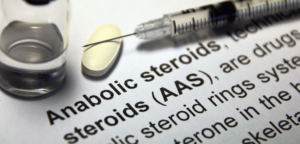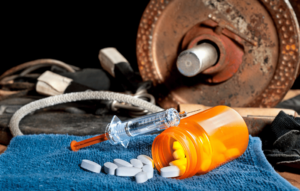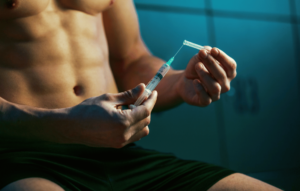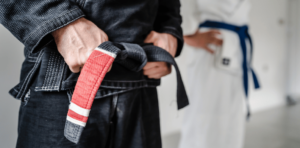Grappling sports like Brazilian jiu-jitsu (BJJ), submission grappling, and wrestling are known for their intense physical demands and technical complexity. These sports push athletes to their limits, requiring immense strength, endurance, and mental toughness. As the competitive stakes rise, so does the temptation to gain an edge – and for some, that edge comes in the form of anabolic steroids. Performance-enhancing drugs (PEDs), which include but are not limited to steroids, have sparked fierce debates within the grappling community, raising questions about ethics, health, and the future of the sport.

The Appeal of Steroids
Steroids offer distinct benefits that align closely with the demands of grappling. Increased muscle mass, enhanced recovery, and improved endurance are among the key advantages that can give an athlete a competitive edge. Grappling’s inherently grueling nature often leaves competitors nursing injuries or dealing with extreme levels of fatigue. Steroids can help them bounce back quicker, enabling them to train harder and longer.
For professional grapplers, the pressure to perform at the highest level can be overwhelming. Winning a major tournament like the ADCC or an IBJJF world championship can change a career overnight. You can imagine how the lure of faster recovery and improved physical performance might seem like a necessary evil in such a competitive environment. Even at amateur levels, the drive to excel and keep up with peers who may already be using PEDs creates a seriously slippery slope.

Steroids in Professional Grappling
The issue of steroids in grappling is not new, but it has become increasingly visible in recent years. High-profile athletes have been caught or suspected of using PEDs, shaking the community’s faith in fair competition. While some organizations, like the International Brazilian Jiu-Jitsu Federation (IBJJF), have implemented anti-doping policies,enforcement remains inconsistent and controversial at best.
The Abu Dhabi Combat Club (ADCC), known for its prestigious submission grappling tournaments, has faced criticism for not conducting drug tests and, in turn, creating an environment where PED use is sort of the norm. On one hand, some athletes argue that this openness creates a level playing field – everyone competes under the assumption that PEDs are a possibility. The lack of consistent regulation highlights a key issue: grappling lacks the uniform anti-doping standards seen in other sports like MMA or Olympic wrestling.
Gordon Ryan’s Take on Steroids
One of the most outspoken figures on the topic of steroids in grappling is Gordon Ryan, a decorated ADCC champion who is considered one of the greatest ever. Ryan has openly justified his use of steroids, calling it a “no-brainer” due to their legality in most grappling events. “The only thing people care about is whether you won or lost,” Ryan stated in a video addressing the issue. He emphasized that legacy and achievements outweigh the controversy surrounding PEDs.
Ryan’s perspective sheds light on the permissive culture within the sport. He notes that when he began using PEDs in 2017, there were no anti-doping policies in major jiu-jitsu organizations like the IBJJF. According to Ryan, even the IBJJF’s later introduction of testing protocols seemed targeted, claiming it was implemented “to make sure Gordon doesn’t win again.”

Despite the health risks associated with PED use, Ryan expressedwillingness to trade years of his life to secure his legacy as one of the greatest grapplers of all time. “Even if it were to take 20 years off my life, I wouldn’t regret doing the things that I’ve done to become the greatest of all time in this sport,” he stated. For Ryan, the sacrifice is worth the reward, framing PED use as a tool for maximizing his potential rather than a means of cheating.
Ethical and Health Considerations
The ethical debate surrounding steroids in grappling centers on fairness. Is using PEDs an unfair advantage, or is it simply a means of leveling the playing field in an environment where steroid use is often an open secret? For many, the line is clear: grappling is about skill, strategy, and grit, not pharmacological shortcuts – for them, PEDs undermine the spirit of the sport and disadvantage those who choose to compete clean. Even against the “leveling the playing field argument” there is a question of “Are we really leveling the playing field or changing the game to who can physiologically respond best to PED’s?”
From a health perspective, the risks of steroid use are well-documented. While short-term benefits like improved performance and recovery may be appealing, the long-term consequences – including cardiovascular issues, liver damage, and hormonal imbalances – are severe. For younger athletes or those new to grappling, the pressure to use PEDs can lead to a lifetime of health complications. Beyond physical risks, there are psychological effects like aggression and dependency that can further complicate an athlete’s well-being.
Cultural Perspectives on Steroid Use
The perception of steroids varies widely within the grappling community. Among recreational practitioners, PEDs are often viewed with disdain or as unnecessary. However, in professional circles, attitudes can be more permissive, reflecting the high stakes and physical demands of the sport.
Regional and cultural differences also play a role. In countries where steroid use is less stigmatized or more accessible, athletes may feel less moral conflict about using PEDs. Conversely, in regions with strict anti-doping measures and a cultural emphasis on clean competition, the use of steroids is met with harsher criticism. These differing perspectives create a fragmented landscape, complicating efforts to address the issue on a global scale.
The Future of Grappling Without Steroids
To envision a future where grappling thrives without the shadow of steroids, significant changes would be necessary. Anti-doping measures would need to become more consistent and robust. Organizations like the IBJJF could set a precedent by increasing the frequency and transparency of their testing protocols. However, this approach requires substantial funding and logistical support, which smaller organizations may struggle to implement.
Athletes also need better access to alternatives that enhance performance and recovery naturally. Advanced training methods, tailored nutrition plans, and legal supplements can offer viable solutions. Education is crucial in promoting these alternatives and highlighting the dangers of PEDs. Coaches, trainers, and mentors play a pivotal role in shaping the choices of up-and-coming grapplers, emphasizing long-term health over short-term gains.
Closing Thoughts
Steroids in grappling present a complex challenge, intertwining issues of ethics, health, and culture. While the benefits of PEDs may seem appealing to those seeking an edge, the costs – both to individual athletes and the integrity of the sport – are hard to look past. Grappling thrives on the principles of discipline, technique, and resilience, and preserving these values requires a collective effort to address the steroid issue head-on.
The path forward is not without obstacles, but with consistent anti-doping measures, better education, and a renewed emphasis on clean competition, grappling can evolve into a sport where strength and skill prevail over pharmacological shortcuts. The question remains: will the community rise to the challenge, or will steroids continue to cast a shadow over one of the world’s most dynamic and demanding sports?








